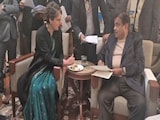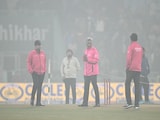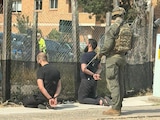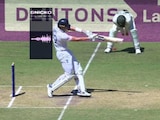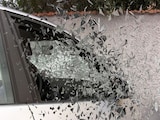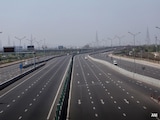File Photo: Bombay High Court
Mumbai:
The Bombay High Court today restrained Maharashtra government from acting on its August 27 circular issued to prevent misuse of section 124A of IPC which deals with sedition till the state files a reply to two petitions challenging the constitutional validity thereof.
The order was delivered by a division bench headed by Justice VM Kanade who was hearing the petitions. One was filed by famous cartoonist Aseem Trivedi and three others while the other one was filed by advocate Narendra Sharma.
The bench asked the state to file its reply by October 20 failing which the court would treat these petitions as uncontroverted and decide them at the admission stage itself.
The government pleader made a statement that the state would take a final stand on the circular.
It may consider to either withdraw the circular or issue a fresh one in view of the controversy, the court was told.
The circular, which has sparked a row, has laid down certain conditions required to be considered for initiating action against a person under section 124 A of IPC which deals with sedition.
According to the petitioners, the circular of August 27 was unconstitutional and violated fundamental rights of citizens.
Mr Trivedi was arrested on September 8, 2012, on the basis of an FIR under section 124A (sedition) and other provisions of IPC for cartoons published on "India Against Corruption" website. However, on a PIL, the Bombay HC had granted him bail.
Later, the state government, on the advice of the Advocate General, had dropped the charge though the case under other provisions of IPC continued against him. The state came out with a circular on August 27 this year laying down conditions to be observed while invoking sedition offence. This circular has been challenged by Mr Trivedi and others.
Mr Trivedi's lawyer Mihir Desai contended that some clauses of the circular issued by the state were vague and contrary to the law laid down by the Supreme Court as well as High Courts.
His petition opposed the circular as it allegedly said that any citizen criticizing a public personality or a politician is responsible of an act of sedition.
"This ambiguity can be misused by the state against an individual citizen for fair criticism of politician or public personality and or against a fair criticism of their policies."
The petition further said that the circular, which is meant to prevent misuse of Sec 124A IPC (sedition) by Law Enforcement Department, does not mention even the basic ingredients required for invocation of this provision of law against any person.
Mr Trivedi and others contended that clause 1 and 2 of the circular does not mention the basic ingredients of sedition i.e words (spoken or written), signs or representations must be made with object to overthrow or subvert the government (central or state) established by law by "violent means", by creating feeling of contempt or hatred or disaffection against it or by bringing or attempting to bring into hatred or contempt towards it or by exciting or attempting to excite disaffection towards it.
The petition said that the "government established by law" has to be distinguished from the persons for the time being engaged in carrying on the administration. Also, a politician is not an administrative figure of the government established by law.
The other petition filed by Narendra Sharma also prayed for similar reliefs while submitting that the circular was unreasonable and against the spirit of the Constitution.
Both the petitions prayed for quashing the circular as it infringed upon the fundamental rights of the citizens and was unconstitutional.
The petitions said that in order to invoke the offence of sedition, the "feelings" of contempt or hatred or disaffection against the government established by law or by bringing or attempting to bring into hatred or contempt towards it or by exciting or attempting to excite disaffection towards it must also be accompanied by apprehension of public disorder "by acts of violence."
The petitioners contended that clause 1 and 2 of the circular does not mention that "apprehension or anticipated danger" must be based on reasonable ground that the danger apprehended is real and imminent.
The order was delivered by a division bench headed by Justice VM Kanade who was hearing the petitions. One was filed by famous cartoonist Aseem Trivedi and three others while the other one was filed by advocate Narendra Sharma.
The bench asked the state to file its reply by October 20 failing which the court would treat these petitions as uncontroverted and decide them at the admission stage itself.
The government pleader made a statement that the state would take a final stand on the circular.
It may consider to either withdraw the circular or issue a fresh one in view of the controversy, the court was told.
The circular, which has sparked a row, has laid down certain conditions required to be considered for initiating action against a person under section 124 A of IPC which deals with sedition.
According to the petitioners, the circular of August 27 was unconstitutional and violated fundamental rights of citizens.
Mr Trivedi was arrested on September 8, 2012, on the basis of an FIR under section 124A (sedition) and other provisions of IPC for cartoons published on "India Against Corruption" website. However, on a PIL, the Bombay HC had granted him bail.
Later, the state government, on the advice of the Advocate General, had dropped the charge though the case under other provisions of IPC continued against him. The state came out with a circular on August 27 this year laying down conditions to be observed while invoking sedition offence. This circular has been challenged by Mr Trivedi and others.
Mr Trivedi's lawyer Mihir Desai contended that some clauses of the circular issued by the state were vague and contrary to the law laid down by the Supreme Court as well as High Courts.
His petition opposed the circular as it allegedly said that any citizen criticizing a public personality or a politician is responsible of an act of sedition.
"This ambiguity can be misused by the state against an individual citizen for fair criticism of politician or public personality and or against a fair criticism of their policies."
The petition further said that the circular, which is meant to prevent misuse of Sec 124A IPC (sedition) by Law Enforcement Department, does not mention even the basic ingredients required for invocation of this provision of law against any person.
Mr Trivedi and others contended that clause 1 and 2 of the circular does not mention the basic ingredients of sedition i.e words (spoken or written), signs or representations must be made with object to overthrow or subvert the government (central or state) established by law by "violent means", by creating feeling of contempt or hatred or disaffection against it or by bringing or attempting to bring into hatred or contempt towards it or by exciting or attempting to excite disaffection towards it.
The petition said that the "government established by law" has to be distinguished from the persons for the time being engaged in carrying on the administration. Also, a politician is not an administrative figure of the government established by law.
The other petition filed by Narendra Sharma also prayed for similar reliefs while submitting that the circular was unreasonable and against the spirit of the Constitution.
Both the petitions prayed for quashing the circular as it infringed upon the fundamental rights of the citizens and was unconstitutional.
The petitions said that in order to invoke the offence of sedition, the "feelings" of contempt or hatred or disaffection against the government established by law or by bringing or attempting to bring into hatred or contempt towards it or by exciting or attempting to excite disaffection towards it must also be accompanied by apprehension of public disorder "by acts of violence."
The petitioners contended that clause 1 and 2 of the circular does not mention that "apprehension or anticipated danger" must be based on reasonable ground that the danger apprehended is real and imminent.

